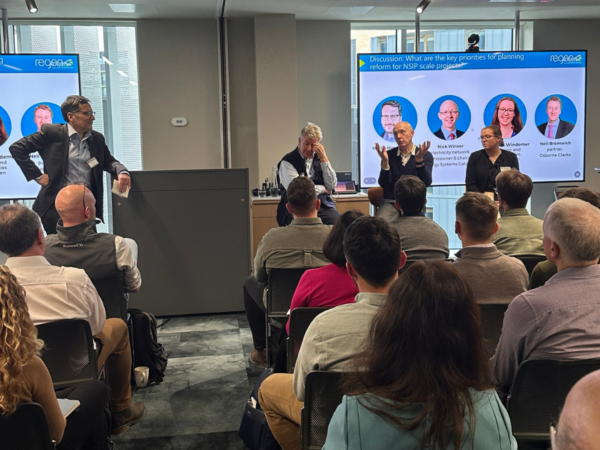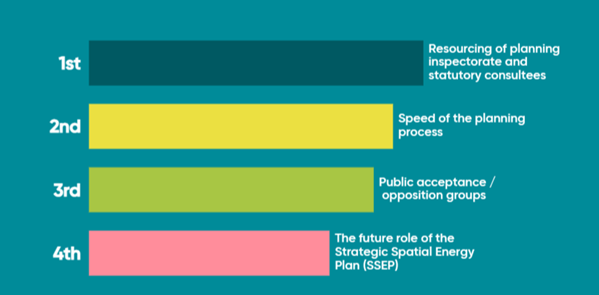
To meet our targets to transform the energy system for net zero we need to build a lot more renewable generation and storage, as well as the necessary grid infrastructure to connect it to customers. However, Regen’s members have identified the planning system for clean energy projects as not fit for purpose, creating delays that impact the deployment of these essential renewable energy, storage and grid projects.
To start addressing this challenge, last week Regen brought together more than 60 industry experts to delve into the key challenges and opportunities facing the planning system. The event, at Osborne Clarke’s offices in Bristol, provided a platform to share insights and explore opportunities for planning reform at both the Nationally Significant Infrastructure Project (NSIP) and local authority levels. Below we have summarised some of the main insights from the event.
Planning for transmission infrastructure
Nick Winser discussed his recommendations on planning from his 2023 report ‘Accelerating electricity transmission network deployment: Electricity Networks Commissioner’s recommendations’. Significantly, this included the need to bring forward a Strategic Spatial Energy Plan to help provide clarity in terms of the supply and demand characteristics of the future energy system and the likely location of strategic projects. He underscored the importance of clarity in planning processes and ensuring that all involved stick to the timescales. Nick also stressed the pivotal role of community engagement and highlighted the potential for significant community benefits for transmission infrastructure projects, also urging for clearer design principles to help with community engagement.
NSIP reform and policy updates
Neil Bromwich, partner at Osborne Clarke, provided insights into the evolution of Energy National Policy Statements including the new Critical National Priority designation. He advocated for closer alignment between National Policy Statements and Town and Country Planning frameworks regarding the prioritisation of renewable energy infrastructure. Neil emphasised the need for clear objectives, streamlined environmental assessment outcomes and the reintroduction of onshore wind projects into the NSIP regime. He also emphasised the pivotal role of a Strategic Spatial Energy Plan in achieving long-term energy goals, highlighting the need for such a plan to be enshrined within a National Policy Statement.
At the event we asked the audience of industry experts to rank their priorities for concerns for planning at the NSIP level. Resourcing of the planning inspectorate and statutory consultees came out as the top concern, closely followed by (and directly linked to) the speed of the planning process.

Local level challenges and solutions
The discussion then delved into the challenges faced at the local authority level. Kirsty Lodge shed light on the experiences of Enso Energy, where she is principal planner, explaining the challenges faced by a shortage of planning officers in local authorities and highlighting the importance of training, resource allocation and community engagement in facilitating smoother project approvals.
Cllr Chloe Turner shared insights from Stroud’s journey, including the lengthy process of developing a new local plan and the challenges in recruiting and retaining planning officers. She also emphasised the importance of community engagement and myth-busting and the role of community energy organisations. Both speakers also discussed the challenges created by planning committees that can sometimes have little knowledge of renewable energy.
Public acceptance and the role of opposition groups was a key element of discussion both for NSIP and local authority-level projects. This topic came top of the audience voting on key concerns for planning at the local authority level. Audience discussion also raised key reasons for refusal, including the recent increase in fire safety concerns for battery storage projects. As with the discussion on NSIP-level projects, resourcing and speed of decision making were also key concerns raised in the room.

What next for our work on planning?
The event shed light on the range of challenges impacting planning processes for renewables and battery storage projects in England, ultimately impacting the speed of obtaining planning consent. It’s evident that significant efforts are needed to improve the planning system’s capacity to handle the anticipated surge in renewable energy applications in the coming years. Attendees expressed a keen interest in fostering collaboration through the establishment of a Regen members’ planning working group, dedicated to shaping policy levers for planning reform. As such we are excited to share that we’ll be holding our first members’ working group meeting on planning in May – more details coming soon!
If you are not yet a Regen member and would be interested in finding out more, please reach out to Hannah Stanley. We are supporting members on key issues on grid connections, planning and markets. More information on our membership packages can be found here.
If you have any questions on Regen’s work on planning or about the planning working group, please contact Rebecca Windemer, planning and communities lead.
